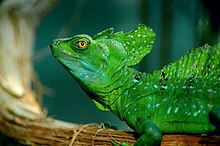Pleurodonta
| Pleurodonta | |
|---|---|
 |
|
| Plumed basilisk (Basiliscus plumifrons) | |
| Scientific classification | |
| Kingdom: | Animalia |
| Phylum: | Chordata |
| Class: | Reptilia |
| Order: | Squamata |
| Suborder: | Iguania |
| Clade: |
Pleurodonta Cope, 1864 |
| Subgroups | |
|
Corytophanidae |
|
Corytophanidae
Crotaphytidae
Dactyloidae
†Gobiguania
Hoplocercidae
Liolaemidae
Opluridae
Phrynosomatidae
Polychrotidae
Tropiduridae
Pleurodonta (from Greek lateral teeth, in reference to the position of the teeth on the jaw) is one of the two subdivisions of Iguania, the other being Acrodonta (teeth on the top [of the jaw]). Pleurodonta includes all families previously split from Iguanidae sensu lato (Corytophanidae, Crotaphytidae, Hoplocercidae, Opluridae, Polychrotidae, etc.), whereas Acrodonta includes Agamidae and Chamaeleonidae. The name Pleurodonta was first used by paleontologist and herpetologist Edward Drinker Cope in 1864, although he used it in a different sense than it is used today. Because of this difference, the name Iguanoidea has been proposed as a replacement for Pleurodonta in phylogenetic nomenclature.
...
Wikipedia
